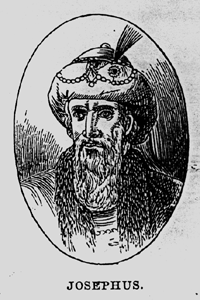
Josephus is an invaluable source for the history of Judaism in the Second Temple period.
Louis H. Feldman offers the following comments on Josephus (The Anchor Bible Dictionary, v. 3, pp. 981-982):
Josephus was born in 37 C.E. and was given the Hebrew name Joseph ben Mattathias. His mother was a descendant of the Hasmonean family that had ruled Jerusalem a century earlier, and by birthright he was a priest. In Jerusalem he received a superb education, and at the age of 27 (in 64 C.E.) he led a delegation to the court of the Roman emperor Nero. Two years later he was pressed to serve as the general of the Jewish forces in Galilee in the revolt against Rome. He was captured and afterwards became a Roman citizen and pensioner of the Flavian emperors Vespasian, Titus, and Domitian. He is most widely known by the Roman name he then acquired, Flavius Josephus (or simply "Josephus").In Rome Josephus resided in an apartment within the emperor's house and devoted much of his time to writing. In part his works were addressed to his fellow Jews, justifying to them not only Roman conduct during the Jewish War, but also his own personal conduct in switching loyalties. However, his writings were also designed to justify Jewish culture and religion to an interested and sometimes sympathetic Roman audience. The earliest of his extant writings is the Bellum Judaicarum (or Jewish War), which was apparently drafted initially in Aramaic and then translated into Greek 5 to 10 years after the 70 C.E. destruction of Jerusalem. His second work, Antiquitates Judaicae (or Jewish Antiquities), was published more than a decade later; it was much longer, and recounts Jewish history from creation to the Jewish War, and contains some valuable historical information. His last two works, probably published shortly before his death, include the Vita (or Life), an autobiography intended primarily to defend his conduct during the Jewish War 30 years earlier, and Contra Apionem (or Against Apion), an apologetic defense of Judaism against a wave of anti-Semitism emanating from Alexandria. Josephus probably died ca. 100 C.E., several years after Trajan had become emperor in Rome. His writings, while generally ignored by fellow Jews, were preserved by Christians not only because they chronicled generally and so well the "time between the testaments," but also because they contained specific references to John the Baptist, Jesus of Nazareth, and Jesus' brother James.
On the much-disputed matter of whether Josephus mentioned Jesus, see my essay on the Testimonium Flavianum.
Although a "Discourse to the Greeks on Hades" is present in Whiston's translation, few if any scholars today believe that Josephus wrote this work. This is why parallels with NT phrases have been italicized at Wheaton's on-line library (above). I am informed of the following by Stephen Carlson:
After posting to Ioudaios, I received two replies (copied herein) that state that it is well-settled that Josephus did not write this discourse.
Stephen
======
From: "Matthew A. Kraus" <Matthew.A.Kraus@williams.edu>
To: "First Century Judaism Discussion Forum" <ioudaios-l@Lehigh.EDU>
Subject: Re: IOU: "Josephus's" Discourse to the Greeks on Hades
In fact the passage belongs to a work by Hippolytus of Rome entitled Against the Greeks and Plato on the Universe. The work is lost except for a rather lengthy fragment preserved in John of Damscus' Sacra Parallela which includes the excerpt on Hades and the comparison between Minos, Rhadamanthos, and Christ. The myth of Josephan authorship stems from Photius' Bibliotheca 48, which refers to a peri tou pantou of Josephus. However, Photius himself doubted the attribution to Josephus and cited a marginal note indicated a presbyter of Rome named Gaius as the author. As the marginal note claims that Gaius also wrote the Labyrinth which is another title for Hippolytus' Philosophumena, the gloss essentially got the authorship right, but confused the names Gaius and Hippolytus. The fragment is readily available on the Thesaurus Linguae Graecae cd-rom under Hippolytus, on the universe (around line 80).Matthew Kraus
Assistant Professor of Classics
Williams College[(XXX)XXX-XXXX]
======

From Steve Mason <smason@yorku.ca>
To: "First Century Judaism Discussion Forum" <ioudaios-l@Lehigh.EDU>
Subject: Re: IOU: "Josephus's" Discourse to the Greeks on HadesStephen Carlson asks for another:
>>Does anyone know anything about the suggestion that the Discourse to the
>>Greeks on Hades of "Josephus" is spurious?More than a suggestion: for just the reasons noted by your questioner. Whiston (early 18th cent) could only argue for authenticity by virtue of his premise that josephus was a Christian and became bishop of Jerusalem. That proposal has been thoroughly discredited; a fortiori....
Steve Mason, Academic Director
Centre for the Support of Teaching
[address, etc., deleted]
Thus we have Josephus' Wars, Antiquities, Against Apion, and Life as his extant works.
Go to the Chronological List of all Early Christian Writings
Please buy the CD to support the site, view it without ads, and get bonus stuff!
Early Christian Writings is copyright ©
Peter Kirby <E-Mail>.
Kirby, Peter. "Flavius Josephus." Early Christian Writings. <http://www.earlychristianwritings.com/josephus.html>.